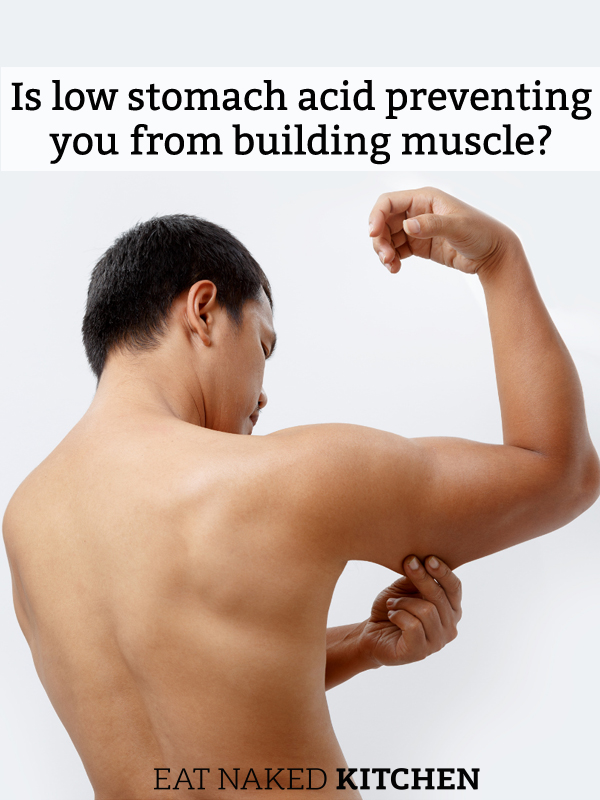Bruce (not his real name) was doing everything right.
He was eating a clean, mostly paleo diet. He was exercising regularly with a trainer. He took his supplements.
But something wasn’t right.
No matter how well he ate or how much he worked out, he just wasn’t building muscle. When he came to me, he was, as he described it, “soft”. He wasn’t necessarily overweight, he was just kind of mushy. His muscles weren’t well defined and had I not known about his lifestyle, I’d have said this guy needs to hit the gym!
He was hitting the gym – had been for years – and was getting no results. He’d lost a bit of weight and he was getting somewhat stronger, but he simply wasn’t building muscle proportionate to the effort he was putting in.
(And for the gym rats among us, yes, he was exercising properly. This isn’t someone who was on the stairmaster doing hours of continuous rate cardio.)
His situation was a bit of a head-scratcher. That is, until we dug into his health history.
It turns out, Bruce had struggled with GERD for years and had been prescribed PPIs over 10 years earlier, which he still took daily.
PPIs are Proton Pump Inhibitors. They’re a class of medication that block the stomach’s ability to secrete hydrochloric acid (HCl). They’re among the most widely prescribed and sold medications in the world, used regularly to manage symptoms of GERD, stomach ulcers, H Pylori infections, and gastritis.[1]
As soon as I learned his history of GERD and long-term use of PPIs, I suspected we’d found the culprit behind his body’s stubborn inability to build muscle.
You see, the stomach acid is vitally important to the body’s ability to break down and utilize amino acids we get from protein in the diet. Amino acids are the body’s primary building blocks of the body, critical for general body repair and building muscle. He was eating a lot of good quality protein, but the PPIs were blocking his body’s ability to fully benefit from it.
Stomach acid is what I consider to be the key digestive domino. It’s vitally important to your digestive process overall and has many different roles from vitamin and mineral absorption, to stomach emptying, to protecting the body from food-borne pathogens. In Bruce’s case, I was specifically worried about his inability to digest protein.
Here’s how protein digestion works:
When you eat protein, the stomach secretes HCl (stomach acid). When the stomach achieves a sufficiently acidic pH (between 1.5 and 3) this stimulates the secretion of pepsin, the primary enzyme responsible for protein breakdown. Without sufficient HCl, the stomach doesn’t reach the level of acidity required to secrete pepsin, and thus protein digestion is severely compromised.
In Bruce’s case, he could eat all the protein in the world, but his body wasn’t getting the benefit from it.
(Very important point: you don’t have to be on PPIs to have low stomach acidity – or “hypochlorhydria” as this is technically called. In fact, it’s incredibly common in the population at large. In all of my years of practice, I’ve never actually had an adult client who was truly HCl sufficient.)
I explained the action of these PPIs and Bruce was amazed. No one had ever connected those dots for him before.
He worked with his physician to wean off the PPIs while we added gut healing supplements to his protocol. When his body was ready for it, we very slowly added in some HCl to bring his levels back up to sufficiency.
(Important Note: Do NOT wean yourself off of PPIs or any other medication without the supervision and guidance of a qualified medical professional. This process, if done improperly, can be very harmful and lead to serious and very uncomfortable side effects.)
At his next appointment with me, Bruce was a different person. He had leaned out, and proudly showed me the definition in his triceps. He said both his trainer and his girlfriend couldn’t believe the difference. And if anything, he hadn’t been as strict with his diet!
Over the course of the next few months, Bruce met his target weight, gained significant muscle mass, and looked and felt amazing.
If you’re having issues building muscle, leaning out, and feel “soft” despite a clean diet and solid exercise plan, then HCl deficiency could be at the root. As a starting point, here are 13 signs that you have hypochlorhydria.




